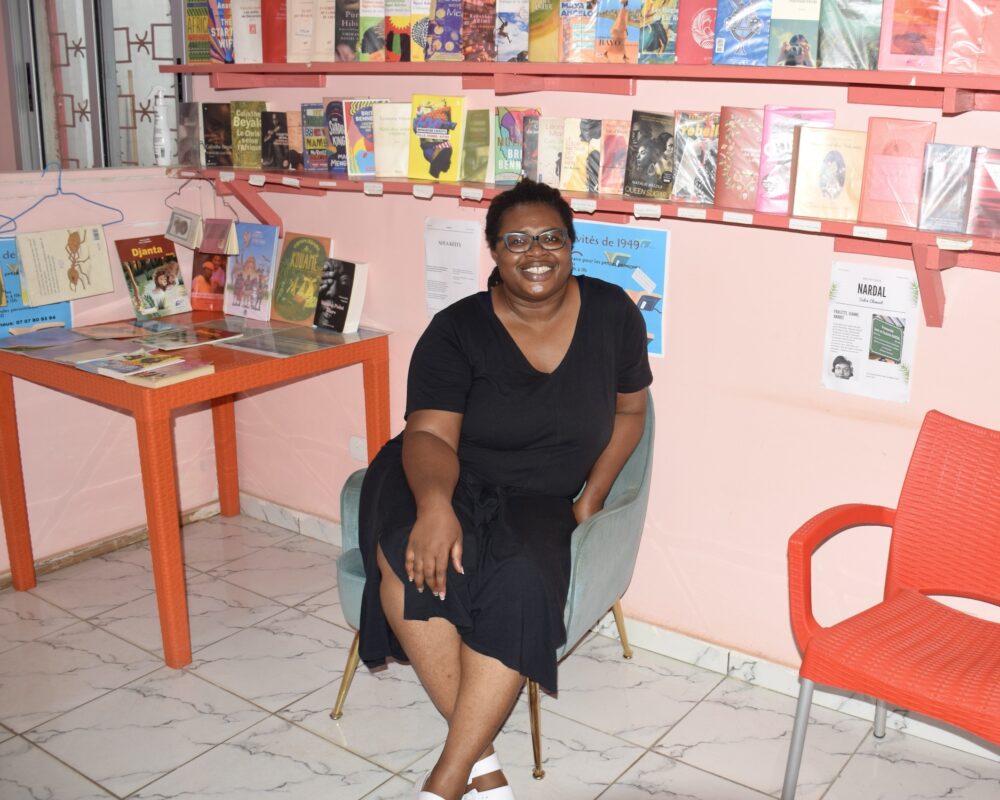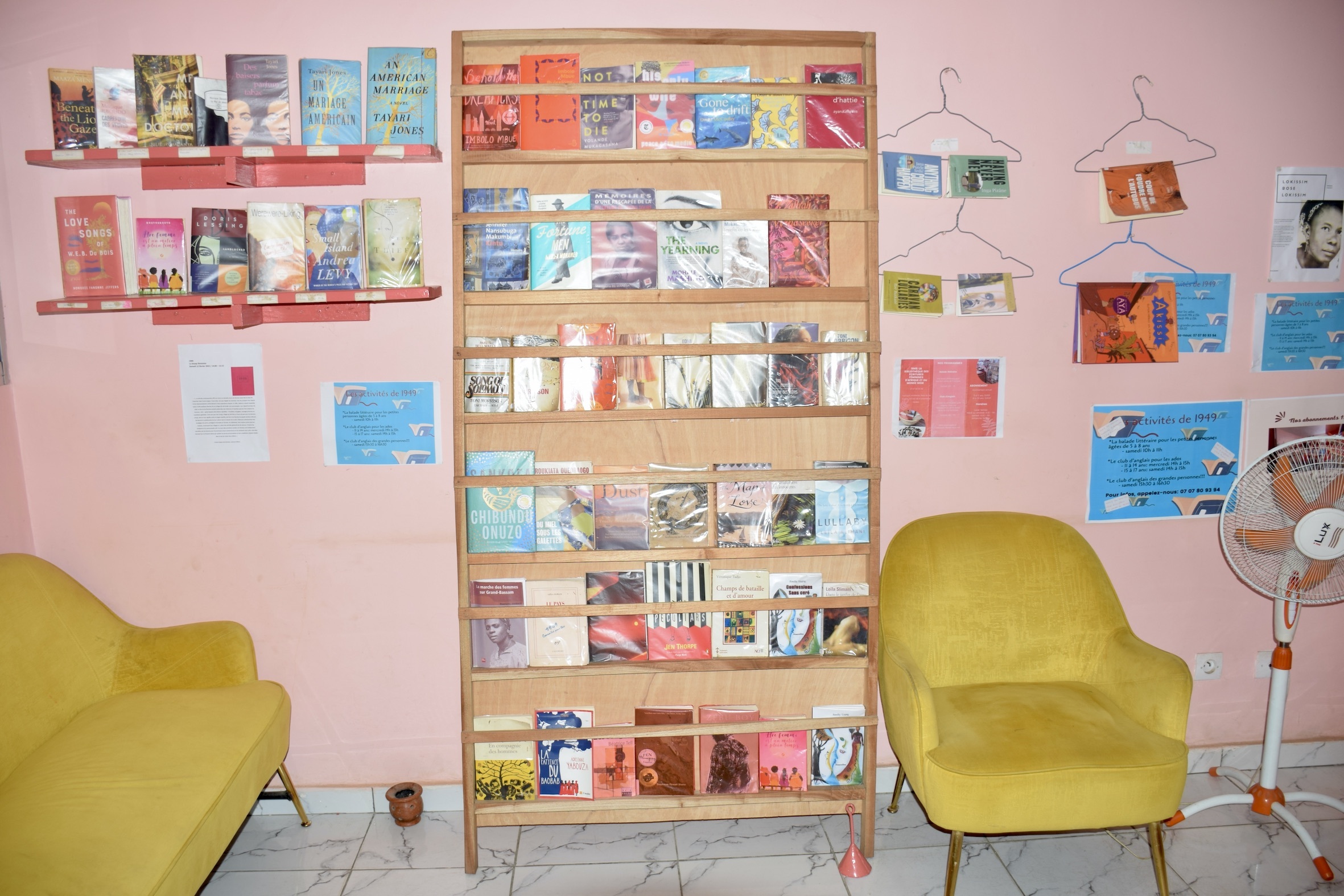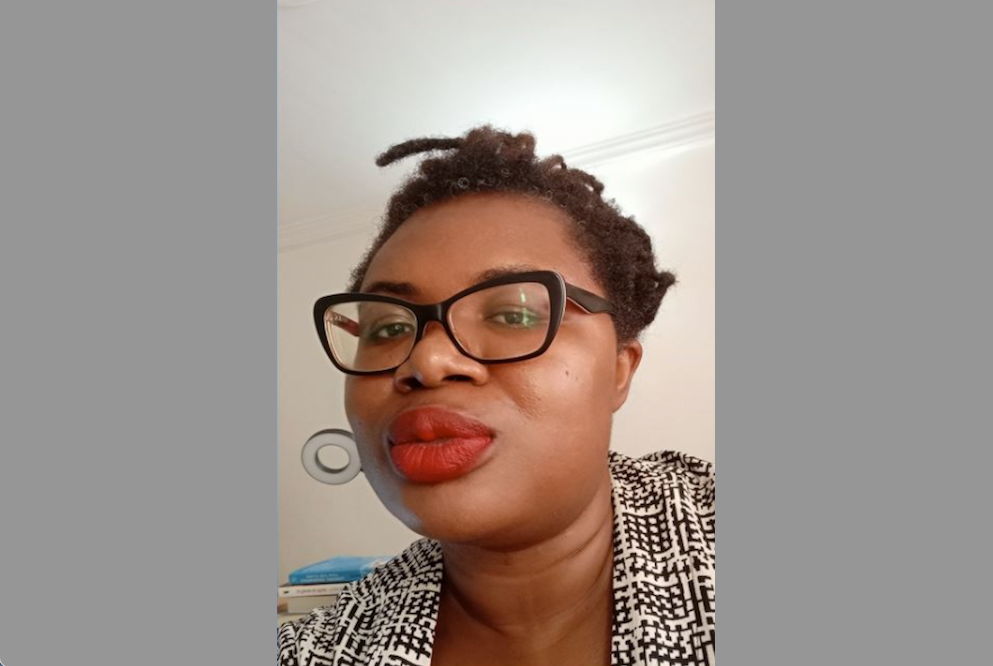“French is not a colonial language”

Edwige-Renée Dro is a literary translator, author, and activist. She lives in Côte d'Ivoire and founded two years ago 1949: the library of women's writings from Africa and the black world in Abidjan. She translates from English into French and vice versa. Her opinion as an African translator may come as a surprise: African books should not only be published in indigenous languages, but also in French.
Which languages did you grow up with?
I grew up with three languages: Bambara, Yacouba, which my parents often spoke among themselves, and French, which was spoken at school. When I was eleven, my family moved to the centre of Côte d'Ivoire and that's when French became more important. Later, I also learned English.
What role did literature play in your childhood?
I grew up reading early. My father's colleagues, who were French, used to give me books, but I didn’t take to them because the stories were not in keeping with my realities. So, to get something to read, I started writing myself at an early age. At home we often talked about literature, even with my mother, who did not know how to read or write, but literature is about stories, right? Later, when I was studying in England, I discovered there were many more books from the African continent available in England than in Africa itself.
You translate from English into French and vice versa. In Côte d'Ivoire there are up to 80 African languages and idioms. Do you also translate from these so-called "indigenous" languages?
No, because they are not written languages, but oral languages. There is no orthography, for example. By the way, I don't like the term "indigenous languages", I just call them "languages". In Côte d'Ivoire we have a high illiteracy rate: fifty per cent of people can neither read nor write. That is why audio forms of literature are very important.
So do audio formats play an important role in the African book market?
No. Audio books and audio formats in general are not widespread here. There is a radio station run by one of the biggest reggae stars in the country, Alpha Blondy. He read books on his radio platform and was very successful. He brought literature to many people without school education, good writers like Ahmadou Kourouma. But he stopped because he didn't have the rights to some of the books he was reading. However, the audio format is something to explore. Mobile phone penetration is very high across Africa, but podcast penetration is not. Upper-middle-class people might listen to them in their cars when they take their children to school, but not much more than that. Radio is still very popular here, though: people love it!
The well-known Kenyan author Ngugi wa Thiong'o chooses to write in his indigenous mother tongue, Kikuyu, to reach less educated people and strengthen African identity. What do you think of this?
The situation in Kenya is very different from Côte d’Ivoire. Kikuyu, the language in which Ngugi writes, is spoken by many people. However, I don't know what the literacy rate is among Kikuyu speakers. There is a huge diversity of languages on the African continent. In Côte d'Ivoire, Baoulé is the biggest language group. Although the language that is spoken and understood the length and breath of the country is Dioula, because it is the main language for commerce. Yet, the lingua franca in Côte d'Ivoire is French. But it is Ivorian French with its own expressions and turns of phrase. So if a writer from Côte d'Ivoire decided to write in Dioula or Baoulé, it wouldn't work because of the literacy rate. You could hardly reach anyone in those languages.
Ngugi wa Thiong'o sees himself as an anti-colonial writer and refuses to write in English because that is the language of the colonialists. What do you think about French in Côte d'Ivoire?
When people talk about French being a colonial language, I say no! For me it is not a colonial language. Maybe in 1893, when the French came and the colonizers oppressed the indigenous people, they might have had a different relationship to the French language. I want to write in French! But I want that Ivorian French we speak here to make its way into the dictionaries. Today I saw that one of the French expressions we use here for “ma copine” or “mon amie”– “ma go” – has made its way into Le Petit Robert. We have different words like that. These are the types of French I want to see in writing. What I hate is when people expect African writers to write in their indigenous language. I’m not talking about the Europeans; it is among ourselves.
But in the TED Talk you held 2015 in Abidjan, you emphasised that the cultivation of African languages is important for cultural identity…
Yes. A problem about our African languages is that people often feel ashamed of speaking them. When I was at primary school, when they caught you speaking your language, they would put an ugly necklace made of animal bones around your neck, so that everybody could see you had spoken in your language. The point of it was to foster shame. That is what I disagree with.
Our African languages give us an identity. This is very important, but we shouldn’t wear our identity on our back as if it is the only thing we have. We have several languages here. I want the African languages, Ivorian French and the French spoken in France to be on the same level.
Concerning this issue, our Institute of National Languages needs to do its work. It would be interesting for me if they promoted African languages so well that a student felt confident to translate my books into Yacouba or Bambara, so that we could have a larger conversation around literature.
What about self-publishing literature on the internet? Is that common?
Not so much, because we still love the idea of the book. In Côte d'Ivoire many print books are self-published. There are not many publishers, that's one reason. And the publishers are often not professional. Sometimes we just call them "book printers". The authors don't get their rights or their sales from them, so they prefer to self-publish their books and get all the money directly. Unfortunately, these books are usually quite flat because there are no creative writing workshops. People don't know there is an editing process after the first draft. They remove the orthographic mistakes and then they think they have a book.
Where do you see a need for change or promotion in the African literature market?
A lot is being done already. For instance, in literary translation, in creative writing workshops. And there is more conversation happening across the different linguistic borders in Africa. If there is one thing I’d love to see, it is to sort out the distribution rights between the different countries in Africa. Some of the countries, like Senegal, have signed tariff agreements so when books come into the country, they don’t need to pay any tax duty. Other countries like Benin or my own country have signed this same law, but the reality on the ground is very different. When you go in with your books, you have to pay tax duty. That means we cannot be competitive because our books are super expensive. Especially when they’re imported from overseas. A European book sold in Africa costs about 28 euros. But the monthly salary of a person from the Ivory Coast is 100 euros on average. Nobody can afford that! Except maybe middle-class people.
What else needs to change?
If we want to be competitive, we need to understand that publishing is a business. We need to have books with better covers, with beautiful pages, because who wants to spend their money on trash? We also need good publishing houses and a good printing infrastructure. Otherwise, you have to send the PDF of your book to India or the UK to be sure of the quality. But progress is being made, we just need a bit more. (laughs)

Edwige Dro's library hosts a book reading once a week during lunch break.
Literature is linked to literacy, which is also a big issue, isn't it?
Obviously, literacy is a big topic. Sometimes people ask me if I can offer literacy classes. But I can’t do everything – I’m not going to burn out! (laughs). The education minister can take care of that. I’m interested in having conversations around literature, in showing how fun literature is, giving an overview of the many topics, the different authors. Although in my country 41 to 51 per cent of the population cannot read or write in any language, 90 per cent can understand and speak French. I want to work with that. I want to get books in translation read, so that everybody has access to literature, whether you finished school in grade two or you have a doctorate.
How do you intend to do that?
In my library in Abidjan, we read a book once a week. With young students from art school we do half-hour book adaptations, because you cannot read a whole book at lunch time. It’s a bit like the summary of a book, with some dialogues. When we started, there were about five of us, and now there are thirty! Although some people complain: do we only read women writers? And I say yes, we only have women writers in this library! (laughs)
What I’d love to do is put stories by young Ivorian writers coming out of the creative writing workshop into a podcast format, as well as a written format. And then have local radio stations broadcast the stories, so that all kinds of people can listen to them. In another project I want to work with literature students from the university and translate some of these stories into Yacouba and broadcast them on the local radio station, so we can reach people who do not speak French well.
Literary translators struggle to make a living, even in Europe, in Switzerland. How is it in Africa?
Everywhere we struggle! We are always hustling! We have day jobs and side jobs. Actually, I’m quite privileged, because all my side jobs revolve around writing and literary translation.
Is literary translation promoted somehow?
No. In 2019 I started doing workshops with the University of Bristol in the UK and Bakwa magazine in Cameroon, because it is a bilingual country. They have some infrastructure and a literary magazine. At my library we did a master class on literary translation. Every other week we do a translation slam. Even university English students don’t know what literary translation is, that you need to read a lot. Students who study French, German, Spanish or English here don’t know any other options than becoming teachers. I wanted to show how many different professions exist within the publishing industry. You can be not just a writer, you can be a publisher, an editor, a copywriter or literary translator.
Interview: Janine Messerli, Translation House Looren

Short biography
Edwige Renée Dro is a writer, literary translator, and literary activist from Côte d’Ivoire. Her short stories and articles have been published in anthologies such as New Daughters of Africa, Africa39, the Eastern African Literary and Cultural Studies, This is Africa, etc.
As a literary translator, she has mentored emerging literary translators as part of the Bakwa Literary Translation workshop that birthed the anthology: Your feet will lead you where your heart is / Le crepuscule des âmes soeurs. She is also the translator of the anthology Les oiseaux d’eau sur la rive du lac / Water birds on the lakeshore (English and French), the children’s book: Rêve d’oiseau by Shenaz Patel (A Dream of Birds – English), the short story: Petit Pa by Hemley Boum (Little Pa – English), etc.
Edwige is a 2018 Miles Morland Writing scholar, a 2019 Mandela Washington fellow, a 2021 Iowa International Writing Program fellow, and a nominee for the 2022 Rolex Arts Initiative Mentorship program.
In 2020, she founded 1949: the library of women’s writings from Africa and the black world in Abidjan.
Photos library: ©Audrey/1949; Selfie: ©Edwige Dro
* * *
In June Edwige Dro participated in the panel discussion litafrika: translating and publishing across the African continent at Literaturhaus Zurich - together with Zukiswa Wanner (writer, publisher and curator from Kenya) and Lola Shoneyin (publisher from Nigeria).
Watch the recording of the discussion on Youtube here:
* * *
The exhibition trilogy “litafrika” addresses the literatures of the African continent from a range of perspectives. It is conceived and created by the Litar Foundation and Strauhof Zurich, in conjunction with partners from several African countries. We would like to draw your attention to the current exhibition: Poetries of a Continent (until 4 September). https://litar.ch/en#s-litafrika

